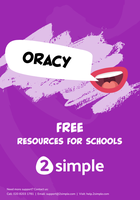Teaching Oracy in Primary Schools
May 28, 2025
What Oracy Is and Why It Matters
Oracy featured in the Government's Curriculum and Assessment Review, and has been highlighted by them as something they want to make 'a priority at all stages of education - so that every young person leaves school with the confidence and skills to use their voice to overcome barriers and make the most of their lives.'

Oracy is the ability to express yourself clearly and fluently when speaking, being able to articulate ideas and opinions to other people, as well as having good listening skills. The English Speaking Union says that oracy skills boost a whole range of social, emotional and interpersonal skills, including self-confidence, self-awareness, resilience and empathy.
In 2023, The National Literacy Trust found that
almost a third (31%) of five-year-olds started primary school without the language, communication and literacy skills they need to thrive -
this statistic rises to almost half (47%) of children from disadvantaged communities
Benefits of Teaching Oracy at an Early Age
- Better learning outcomes:
The Education Endowment Foundation found that young children who are explicitly supported with their communication and language development make approximately seven months’ additional progress over the course of a year.
Children who struggle with language at age five are six times more likely to fall behind in reading and writing by the age of 11. - Better employment opportunities:
Lower levels of oracy and communication can cost the economy £7800 per child on average, due to limited employment opportunities and earnings.
In 2022, Teach First found that 72% of employers were either 'fairly concerned’ or ‘very concerned’ about the level of soft skills – such as communication and presentation – amongst school, college and university leavers. - Better mental wellbeing:
There is a link between poor oracy and lower levels of wellbeing, as well as associations with anxiety. This is likely due to the barriers that poor oracy can create when in social situations.
(Information from National Literacy Trust's Oracy Report: Creating Confident Communicators)
Free Oracy Resources for Primary Schools
How do teachers go about developing oracy in school? 2Simple have put together a free pack to help schools get started, with lots of practical activities and ideas.
Inside the pack, there are 5 different activities to try with your class, including:
- Recognising emotions
- Using specific words in conversation
- 'Would you rather...' discussion
- Debate about homework
- Persuasion activity
All activities come with an explanation and resources, including printable cards and worksheets.

Oracy Resources in Purple Mash
The free pack is just a selection of the Oracy resources available inside Purple Mash. With a Purple Mash subscription, teachers will have access to:
- Talking prompts:
Eight challenges to prompt discussion around classroom topics - Videos:
A video introducing oracy to students, as well as three further videos which introduce Oracy Activities. They include- How to interview somebody well
- Make a dull subject sound exciting
- Using a variety of words when speaking
- Printable Oracy Activities:
Nine Oracy activities to use in the classroom with printable resources including word cards and worksheets. - Podcasting Ideas:
Use our new podcasting tool, 2Cast, in your classroom to develop oracy skills. You'll find lots of ideas on podcasting subjects a well as a guide to 2Cast.
Purple Mash subscribers can find all these resources inside the English area. Non-subscribers can get a free trial to explore all the tools and resources that Purple Mash has to offer.